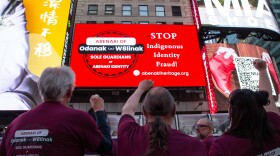-
An effort to remove the statue resulted in pushback, and a conversation about how to add historical context.
-
The project dates to the fall of 2022, when the Vermont Commission on Native American Affairs announced it was getting $50,000 from the foundation of the Burlington-based company Seventh Generation to create materials about Abenaki peoples for K-12 students.
-
The bill would give nominating power to state recognized Native American groups with historical ties to New Hampshire, all of which are based in Vermont.
-
An archaeological dig in Errol yielded 7,000-year-old Abenaki artifacts, bucking the idea that ancient history isn’t here in the states.
-
“Of Baskets and Borers” weaves the stories of early 20th century Abenaki basket-makers with contemporary art, and examines the environmental changes that are threatening the very existence of the craft.
-
A NH nonprofit claiming to be an Abenaki tribe plans to open a cultural center in Claremont. But Abenaki leaders say the group has no credible connection to the Indigenous community.
-
A state commission flagged Durham’s "Oyster River Massacre" marker as problematic. It was taken down. The community had to come together and agree on what really happened over 300 years ago.
-
Filmmaker Alanis Obomsawin received the Edward MacDowell Medal Sunday for her lifetime contribution to the arts and dedication to uplifting Indigenous voices.
-
Scholars and citizens of a federally recognized Abenaki First Nation based in Canada say there is no evidence that leaders of two New Hampshire groups have Abenaki ancestry.
-
"That’s really what we want to help people seep into their brains: That we were here, and we are here,” said Sherry Gould, who helped organize the event.

Play Live Radio
Next Up:
0:00
0:00
Available On Air Stations










